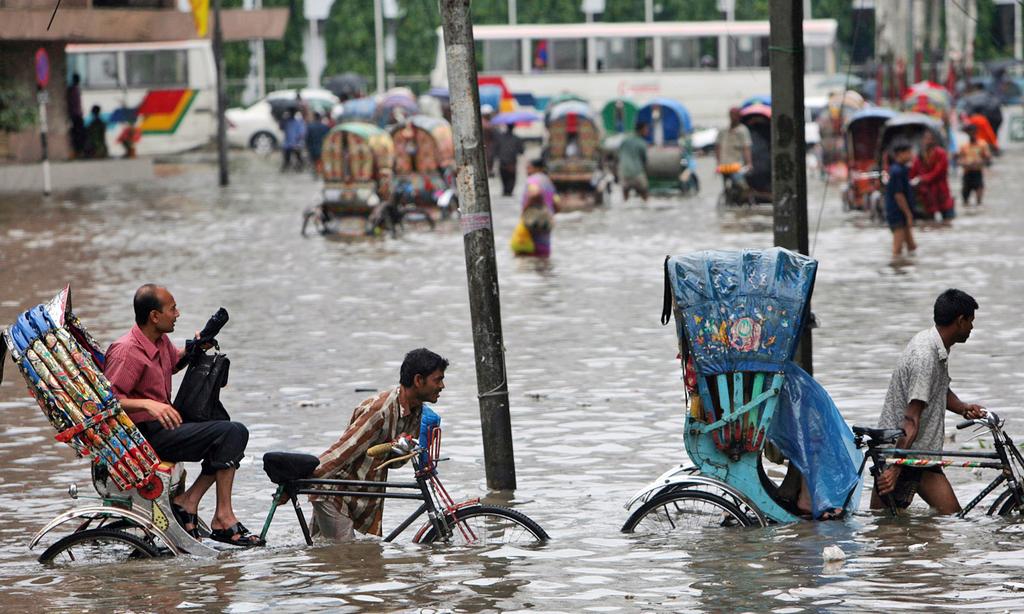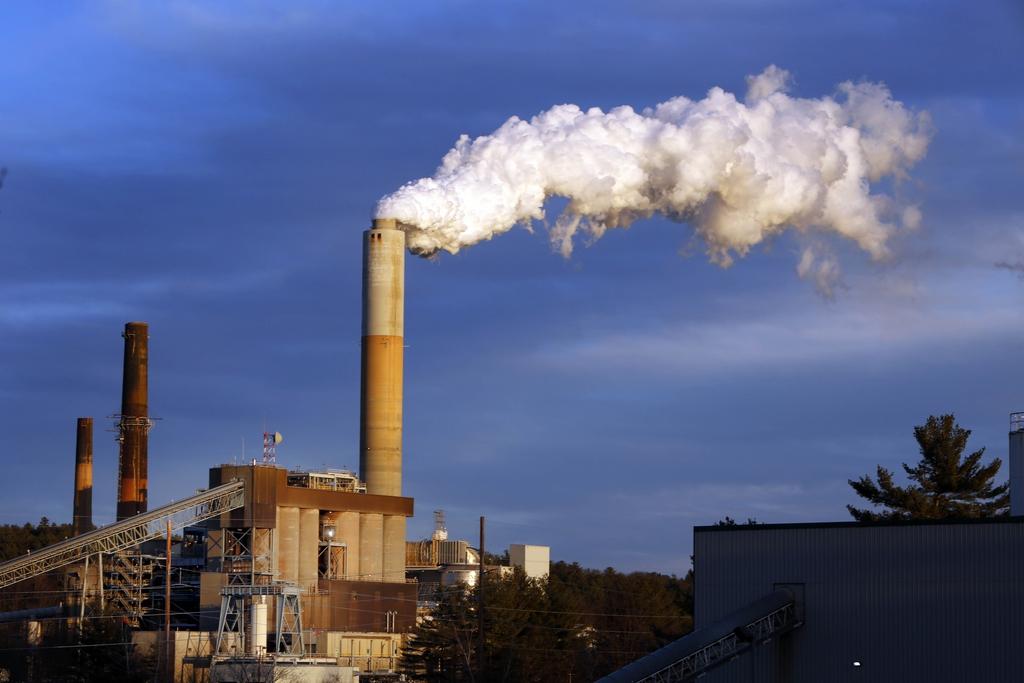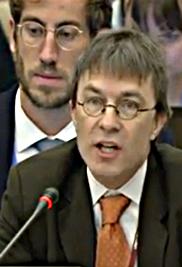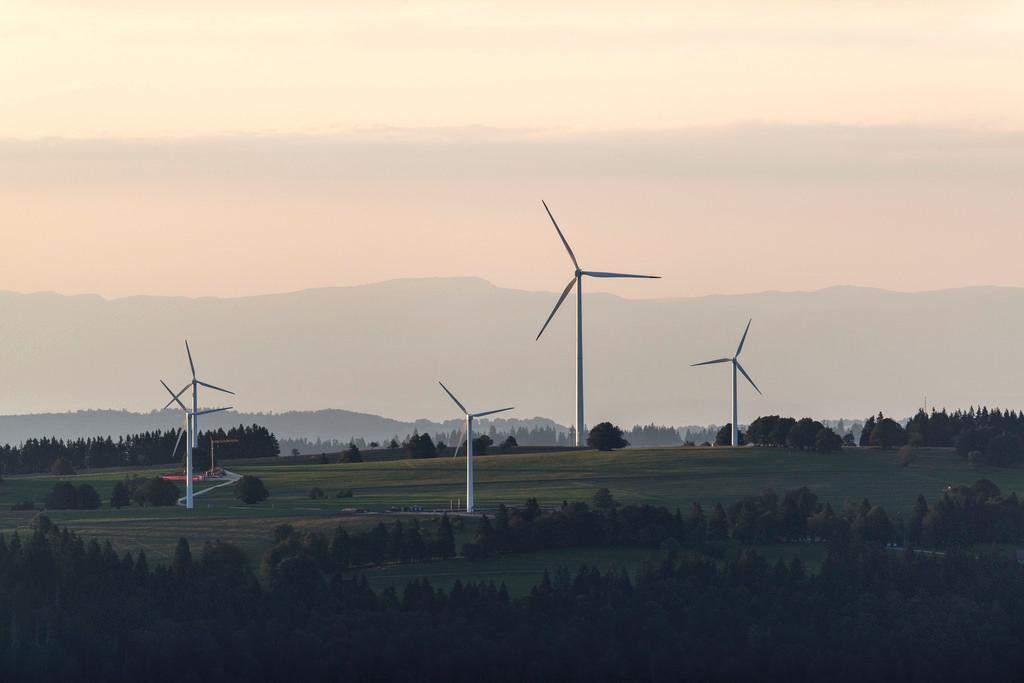Behind the scenes at the Geneva climate talks

For outsiders, it’s hard to get a sense of what happens at climate conferences like the one in Geneva this week. swissinfo.ch tagged along with the Swiss delegation for an insider’s view of the process.
“I was hoping there’d be time for a coffee, but we’ve still got a few points to cover before the next meeting,” says the man in charge of the dozen people seated in an elegant wood-panelled conference room at the United Nations.
Wearing round, wire-rimmed glasses and an alert expression, Franz Xaver Perrez is the Swiss environment office’s Ambassador for the Environment – and the head of the Swiss delegation at the UN Framework Convention on Climate Change (UNFCCC)External link. At 8am on every morning of February’s week-long convention, he meets the full delegation to catch up and set priorities. But it’s not his first appointment of the day; Perrez tells me he already has a working breakfast under his belt.
He listens keenly as his team members share stories from the previous day, making notes and asking one man to organise an informal presentation later on. For now, though, it’s time to hustle down the marble hallway to a meeting with delegates from South Korea, Mexico and Liechtenstein.
“Today we have a journalist with us, reporting on the convention process. Would it be alright if she stayed with us for a little while?” Perrez asks. They look a little perplexed at first, but Perrez smiles at them engagingly – and they agree. A couple of them approach me to exchange business cards, even.
Once the preliminaries are over, Perrez gives me the signal to excuse myself – not because they’re planning to discuss anything terribly confidential, but just so everyone feels more comfortable.

More
Geneva negotiators prepare road to climate pact in Paris
Gate-crasher
Journalists aren’t meant to attend the Ad Hoc Working Group on the Durban Platform for Enhanced Action (ADP), either, but the sign says “open to observers”, so I take a seat. Most of the people speak English, but they’re very hard to hear. Then it occurs to me to grab a headphone intended for simultaneous interpretation – and to keep it on the English channel.
“I think we’re making excellent progress; it’s sort of unprecedented,” says ADP Co-chair Daniel Reifsnyder, thanking the delegates for their efforts and restraint in terms of adding to the already unwieldy document under scrutiny. He notes, “We’re in an extremely good position for the negotiations in Bonn”, where the next UNFCCC session will be held in June.
However, Reifsnyder still calls for additional material: “new ideas not reflected in the text at this time”.
The floor is open, and people flow in and out of the auditorium rather casually. Late-comers stop to grab a sign with the name of a country on it, but I can’t see which. A policewoman patrols the aisle, but everyone’s so calm it’s hard to imagine what she’s looking for.
‘A cappuccino, please’
The coffee Perrez was craving comes hours later – during a break from the Ad Hoc Working Group on the Durban Platform for Enhanced Action (ADP). It’s a while before he can actually take a sip, as colleagues from places as far-flung as Singapore, Egypt, South Africa and Nicaragua stop him to say hello and exchange a few – or a lot – of words. Does the notion of Swiss neutrality come into play when talking about borderless issues?
“We are not neutral in the sense of being a bridge between two conflicting parties – that’s not at all our position. We have to defend our interests here, but we do it differently than the US or China, who are in different positions, of course,” says Perrez. “We are seen, in principle, as being environmentally friendly and ambitious, and as a country that listens to a lot of different proposals, and then tries to work with them.”
While I fetch the cappuccino, multitasking Perrez sets out his phone, tablet and laptop and calls for tech support to sort out an expired password. His phone case, by Swiss fashion label Freitag, is made of a recycled truck tarpaulin. The fuzzy felt tablet cover also has an eco-look, not so surprising for a man in his job.
What is unexpected is the lack of recycling facilities in the sunny UN Serpent Bar. In the waste bins, plastic bottles and aluminium cans mingle with greasy sandwich wrappers and napkins. Surely an eyesore to people working to save the planet? But of course not everybody present is there to represent Mother Earth; some of the delegates are looking out for the interests of big business, or for the general economic welfare of their nations.

Dinner for 15
The password issue resolved, Perrez gives an overview of his work for the week. Depending on their areas of expertise, the delegates attend different sessions and meet with their counterparts. As head of the delegation, Perrez needs to make sure that everybody is on the same page.
“What’s important is that everybody knows what’s going to be said. That’s why it’s important for us to meet regularly every morning and during the breaks. Because we trust each other, it works quite well,” Perrez says.
The agenda is quite full, and although it’s not as hectic as Lima, it still means very long days. On top of the sessions, the informal networking is key.
“In the plenary, you can make a presentation, but nobody is able to listen to three hours of long statements. Some are difficult to understand, some statements reflect that the people making them don’t really understand where we are, and what the big problems are,” explains Perrez.
Mealtime is prime time, thanks to the informal networking opportunities. For nearly every lunch and dinner in Geneva, the Swiss delegation is either hosting or being hosted. Perrez shows me a handwritten list of parties he’s hoping to dine with in the next days.
“We’ve already reserved a table for 15 tonight – now it’s a matter of making sure everybody can come,” he says.
Wait and watch
Perrez gets a text from a teammate; his presence is needed at the ADP again. We work our way back there, stopping a few times for greetings. But this time, it really is “no press allowed”, and I have to wait outside.
I get one of the few seats at a table outside, giving me a good spot to make some notes and observations while keeping an eye on the door. It’s rather amusing to people-watch and guess who’s here to do what. A young woman in a casual sweater and incongruent stilettos hobbles down the hallway, sparking a flash of mirth in the police officer guarding the doorway. An earnest-looking man lopes past, his sensible backpack creasing his sharp suit. A beaming lady in a flowered dress strides by, a blossom tucked over one ear. Finally, people begin pouring out of the session.
Nicotine is what Perrez and a colleague want now, and with this schedule, I can understand why.
Atmosphere
For the Swiss delegation, atmosphere is key – both in terms of reducing CO2 and in the working style. He says that in Lima, their delegation office was probably the loudest – the laughter “an expression of being motivated and enjoying working together. We also have fights, of course, but that’s a different matter.”
What Perrez really likes about the Swiss delegation is the collegial atmosphere.
“In the evening, when you come back from a dinner at 11-11:30pm, you go out and have a beer to discuss things further and it’s fun, but it’s also really hard work,” Perrez says, looking surprisingly fresh for someone who doesn’t get much sleep.
“It’s intense,” says Perrez of Geneva, “But it’s much less hectic than it will be in Paris” – which will start on November 30, about six months after the Bonn session wraps up.
Before coming to Geneva, Perrez says the goal was to have a more streamlined text by the end of the week; something easy to read. However, the co-chairs got a lot of feedback saying that it was too early for that.
“Their main objective is to have a text that will really be endorsed by everybody as a negotiation text. So it will be very long, with many parallel proposals. I understand that approach,” says Perrez.
“It’s less ambitious than what we wanted at the beginning, but there’s also a certain benefit to having that at the end.”
Background: UNFCCC
Geneva is hosting a conference of the United Nations Framework Convention on Climate Change (UNFCCC) from February 8-13, 2015. The UNFCCC, a UN secretariat based in Bonn, Germany, has 196 parties – including virtually all of the world’s nations – and is the parent treaty of the 1997 Kyoto Protocol for cutting industrial heat-trapping gases that warm the atmosphere like a greenhouse.
The Geneva conference is meant to be a negotiating session to prepare for the climate summit in Paris in December. The summit is meant to keep the planet from overheating by stabilising greenhouse gas concentrations at a level that will limit further human-induced climate change. The aim of the six-day conference in the Swiss city is to prepare a streamlined negotiating text for the summit. One highlight will be talks about something called “intended nationally determined contributions”, which are publicly announced commitments that are meant to put the planet on a path towards a low-carbon future. Under the UNFCCC, virtually all the world’s nations would commit to a new climate agreement in Paris based on these contributions.

In compliance with the JTI standards
More: SWI swissinfo.ch certified by the Journalism Trust Initiative












You can find an overview of ongoing debates with our journalists here . Please join us!
If you want to start a conversation about a topic raised in this article or want to report factual errors, email us at english@swissinfo.ch.